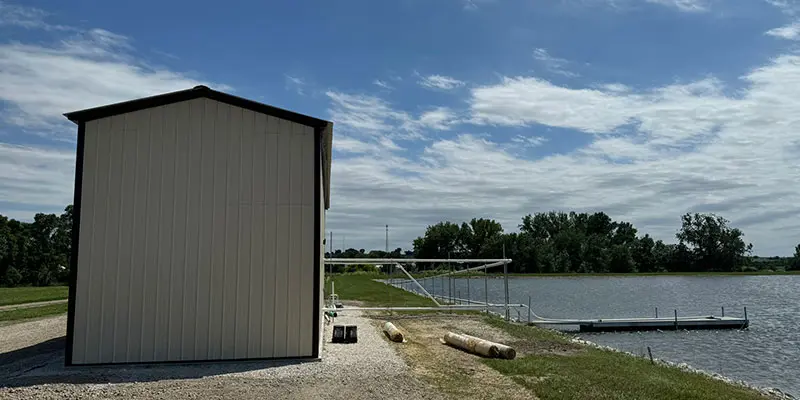With fewer ratepayers and smaller operating budgets, small municipalities often cannot absorb multimillion-dollar wastewater projects. Fluence offers affordable solutions.
Modular systems and smart financing help municipalities meet regulations affordably
Small towns across the United States must meet stricter wastewater discharge limits for nitrogen and phosphorus. State and federal regulators are tightening standards to protect rivers, lakes, and coastal ecosystems, but traditional plant upgrades to achieve those standards can cost millions.
Operations and maintenance demands for today’s standards can also strain the staffing and resources of smaller municipalities. For communities and unincorporated areas with limited tax bases, these challenges can halt growth and trigger rate hikes that taxpayers simply cannot sustain.
Decentralized packaged systems paired with performance-based financing offer small utilities and community water systems a way forward. Compliance becomes attainable on small-town budgets with quickly deployed modular plants and Fluence Water Management Services (WMS), which removes upfront cost and provides long-term operations and maintenance.
The Compliance Challenge
Nutrient regulations continue to tighten nationwide, and the Environmental Protection Agency encourages states to adopt numeric nitrogen and phosphorus standards. Many, including Florida, Iowa, and Wisconsin, have already done so to curb algal blooms, fish kills, and groundwater contamination. But the new rules often push small wastewater systems beyond their abilities.
When treatment plants fail to meet limits, utilities can receive fines or consent decrees, while development may freeze until compliance is restored. The environmental costs can include degraded drinking water sources and aquatic habitat damage.
With fewer ratepayers and tighter operating budgets, small municipalities and unincorporated areas often cannot absorb multimillion-dollar capital projects, yet compliance mandates keep mounting.
Why Traditional Upgrades Don’t Work for Small Communities
Conventional treatment plant expansions are built for cities, not small towns. Centralized designs require extensive civil works, long construction timelines, and large capital outlays that smaller utilities can’t absorb.
Large projects can also create excess capacity that takes years to use, leaving communities paying debt service on infrastructure they don’t yet need and consuming operating budgets that should go toward maintenance, staffing, or upgrades.
Traditional projects depend on specialized contractors and long supply chains, further adding cost and uncertainty. Each step — design, permitting, bidding, construction — adds cost and uncertainty. For small municipalities with immediate compliance deadlines, the conventional path can mean years of planning before construction even starts.
The Modular, Decentralized Alternative

Fluence’s MABR technology enables small towns to achieve advanced nutrient removal within existing plant footprints.
Packaged, decentralized systems change the game for small utilities. Modular treatment units arrive pre-engineered and factory-tested, cutting months or even years off project timelines.
Fluence designs scalable systems that grow in phases with demand. Modular membrane-aerated biofilm reactor (MABR) systems, including Aspiral™ Flex and SUBRE, can upgrade existing lagoons or provide new capacity on compact footprints. Each unit can operate independently or as part of a larger system.
Standard containerized packages with plug-and-play engineering simplify logistics, speed installation, and minimize site disturbance.
MABR systems also use low-pressure air diffusion, cutting aeration energy requirements to about 10% of traditional bubble diffusion, a critical Fluence advantage.
Instead of waiting years for large plant expansions, smaller utilities can deploy compact modular systems that meet strict limits within months.
Financing Tools That Close the Gap
Even when the technology is available, financing can stand in the way of compliance. Traditional capital projects require towns to manage construction and take on long-term debt. For small municipalities, that can delay or even derail urgently needed upgrades.
Fluence Water Management Services (WMS) removes that barrier. Under WMS agreements, Fluence builds, owns, operates, and maintains the treatment plant, while the customer pays only for water service under performance-based agreements. This model unburdens the community of risk and upfront capital cost.
The benefits extend beyond financing. Bundled long-term operations and maintenance by Fluence specialists are a boon for communities that may struggle to staff a wastewater treatment system. WMS ensures consistent performance and regulatory compliance. Instead of managing contractors and maintenance schedules, local officials can focus on community priorities while Fluence keeps the plant running efficiently.
Real-World Examples
Across the Midwest and Gulf Coast, small towns are showing how modular treatment can meet new nutrient limits without overwhelming local budgets.

Compact Aspiral™ MABR units like this one are helping small towns modernize lagoon-based treatment systems quickly and affordably, achieving compliance without large-scale construction.
In Dow City, Iowa, a community of fewer than 500 people, an aging lagoon system could no longer meet new standards for ammonia and E. coli. Working with Fluence, the town is upgrading to a continuous-discharge system using an Aspiral™ M2+ unit with MABR technology. The compact unit operates reliably even in 37-degree water, cutting energy use and achieving effluent containing less than 10 milligrams per liter total nitrogen.
In Florida, nutrient overload from failing septic tanks is driving toxic algal blooms and devastating manatee habitat. While the state moves to replace septic systems, Fluence’s no-dig modular wastewater plants can fast-track septic-to-sewer conversions and deploy weatherized steel units coated for protection against salt air, and hurricane-rated for up to 150 mph winds.
In Wisconsin, hundreds of small communities face steep costs under new phosphorus discharge limits. Modular biological treatment can close that gap, bringing advanced phosphorus removal within reach under WMS agreements that eliminate upfront cost.
A Clear Path to Compliance
Small towns no longer have to choose between breaking the budget and breaking compliance. Fluence’s worldwide experience with small and mid-sized utilities proves every day that compliance and affordability can go together. Contact Fluence to explore modular, energy-efficient wastewater solutions that make compliance achievable for any community.

